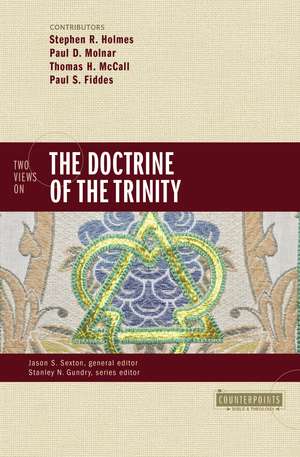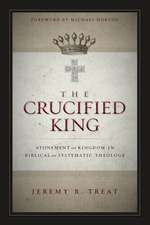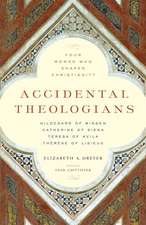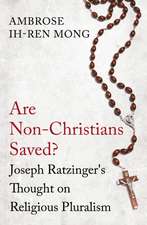Two Views on the Doctrine of the Trinity: Counterpoints: Bible and Theology
Autor Stephen R. Holmes, Paul D. Molnar, Thomas H. McCall, Paul Fiddes Jason S. Sexton Stanley N. Gundryen Limba Engleză Paperback – sep 2014
In order to form a coherent view of trinitarian theology, it's important for Christians to have a working knowledge of the two legitimate models for explaining this doctrine:
- Classical – presenting a traditional view of the Trinity, represented by the Baptist theologian Stephen R. Holmes and the Roman Catholic theologian Paul D. Molnar.
- Relational – presenting the promise and potential hazards of a relational doctrine, represented by the evangelical theologian Thomas H. McCall and the Baptist philosopher Paul S. Fiddes.
Each expert highlights the strengths of his view in order to argue how it best reflects the orthodox perspective. In order to facilitate a genuine debate and to make sure that the key issues are revealed, each contributor addresses the same questions regarding their trinitarian methodology, doctrine, and its implications.
Din seria Counterpoints: Bible and Theology
-
 Preț: 117.52 lei
Preț: 117.52 lei -
 Preț: 119.72 lei
Preț: 119.72 lei -
 Preț: 128.55 lei
Preț: 128.55 lei -
 Preț: 87.23 lei
Preț: 87.23 lei -
 Preț: 107.24 lei
Preț: 107.24 lei -
 Preț: 120.16 lei
Preț: 120.16 lei -
 Preț: 103.36 lei
Preț: 103.36 lei -
 Preț: 120.97 lei
Preț: 120.97 lei -
 Preț: 103.36 lei
Preț: 103.36 lei -
 Preț: 100.92 lei
Preț: 100.92 lei -
 Preț: 119.36 lei
Preț: 119.36 lei -
 Preț: 81.90 lei
Preț: 81.90 lei -
 Preț: 93.33 lei
Preț: 93.33 lei -
 Preț: 108.55 lei
Preț: 108.55 lei -
 Preț: 81.64 lei
Preț: 81.64 lei -
 Preț: 93.84 lei
Preț: 93.84 lei -
 Preț: 92.42 lei
Preț: 92.42 lei -
 Preț: 113.78 lei
Preț: 113.78 lei -
 Preț: 129.55 lei
Preț: 129.55 lei -
 Preț: 89.54 lei
Preț: 89.54 lei -
 Preț: 102.55 lei
Preț: 102.55 lei -
 Preț: 135.43 lei
Preț: 135.43 lei -
 Preț: 106.58 lei
Preț: 106.58 lei -
 Preț: 125.97 lei
Preț: 125.97 lei -
 Preț: 149.68 lei
Preț: 149.68 lei -
 Preț: 127.71 lei
Preț: 127.71 lei -
 Preț: 126.22 lei
Preț: 126.22 lei -
 Preț: 162.99 lei
Preț: 162.99 lei -
 Preț: 124.51 lei
Preț: 124.51 lei -
 Preț: 127.92 lei
Preț: 127.92 lei -
 Preț: 109.95 lei
Preț: 109.95 lei -
 Preț: 124.72 lei
Preț: 124.72 lei -
 Preț: 105.22 lei
Preț: 105.22 lei -
 Preț: 124.51 lei
Preț: 124.51 lei -
 Preț: 144.75 lei
Preț: 144.75 lei
Preț: 124.72 lei
Nou
Puncte Express: 187
Preț estimativ în valută:
23.87€ • 24.87$ • 19.85£
23.87€ • 24.87$ • 19.85£
Carte tipărită la comandă
Livrare economică 11-25 februarie 25
Preluare comenzi: 021 569.72.76
Specificații
ISBN-13: 9780310498124
ISBN-10: 0310498120
Pagini: 240
Dimensiuni: 133 x 203 x 16 mm
Greutate: 0.21 kg
Editura: Zondervan Academic
Colecția Zondervan Academic
Seria Counterpoints: Bible and Theology
Locul publicării:Grand Rapids, United States
ISBN-10: 0310498120
Pagini: 240
Dimensiuni: 133 x 203 x 16 mm
Greutate: 0.21 kg
Editura: Zondervan Academic
Colecția Zondervan Academic
Seria Counterpoints: Bible and Theology
Locul publicării:Grand Rapids, United States
Descriere
Christians have always believed in the triune God, but they haven't always understood or used the doctrine of the Trinity consistently.
In order to form a coherent view of trinitarian theology, it's important for Christians to have a working knowledge of the two legitimate models for explaining this doctrine:
Each expert highlights the strengths of his view in order to argue how it best reflects the orthodox perspective. In order to facilitate a genuine debate and to make sure that the key issues are revealed, each contributor addresses the same questions regarding their trinitarian methodology, doctrine, and its implications.
In order to form a coherent view of trinitarian theology, it's important for Christians to have a working knowledge of the two legitimate models for explaining this doctrine:
- Classical – presenting a traditional view of the Trinity, represented by the Baptist theologian Stephen R. Holmes and the Roman Catholic theologian Paul D. Molnar.
- Relational – presenting the promise and potential hazards of a relational doctrine, represented by the evangelical theologian Thomas H. McCall and the Baptist philosopher Paul S. Fiddes.
Each expert highlights the strengths of his view in order to argue how it best reflects the orthodox perspective. In order to facilitate a genuine debate and to make sure that the key issues are revealed, each contributor addresses the same questions regarding their trinitarian methodology, doctrine, and its implications.
Cuprins
Tentative Table of ContentsIntroduction (Sexton) VIEW ONE: THE SOCIAL DOCTRINE OF THE TRINITYChapter 1: Social Trinity: Catholic/Mainline Perspective Response from Evangelical Social Trinitarian Response from Catholic Classical Trinitarian Response from Evangelical Classical Trinitarian Chapter 2: Social Trinity: Evangelical Perspective Response from Mainline Social Trinitarian Response from Catholic Classical Trinitarian Response from Evangelical Classical Trinitarian VIEW TWO: THE CLASSICAL DOCTRINE OF THE TRINITYChapter 3: Classical Trinity: Catholic/Mainline Perspective Response from Mainline Social Trinitarian Response from Evangelical Social Trinitarian Response from Evangelical Classical Trinitarian Chapter 4: Classical Trinity: Evangelical Perspective Response from Mainline Social Trinitarian Response from Evangelical Social Trinitarian Response from Catholic Classical Trinitarian Conclusion (Sexton)












